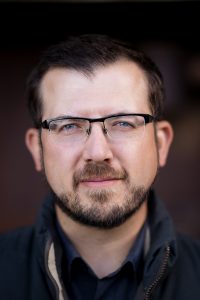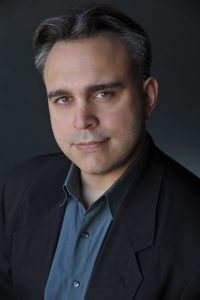It All Started When: Jon Courtenay Grimwood
Jon Courtenay Grimwood is the author of the ‘post-cyberpunk’ Ashraf Bey trilogy and stand-alone novels such as BSFA award winning End of the World Blues. The Fallen Blade is the first book of his new Assassini trilogy.
I discovered SF through Asimov’s Foundation, and fell in love with it after finding a battered copy of Alexi Panshin’s Rites of Passage in a second hand shop. (I thought it the most wonderfully original book ever written; little knowing how old many of the tropes were).
Fans and fandom I discovered hanging out at the Dark They Were And Golden Eyed book shop in central London. In my head it’s dark, crowded, stinks of hash, and has T Rex playing in the background. I didn’t know many people’s names but I was the guy with the blond hair in the corner wondering if he could afford a Ringworld paperback. Then protopunk happened, Dark They Were fell off my radar and suddenly I was reading Burroughs and cutting up my course work, shuffling it and wondering why my essay marks were rubbish.
But I didn’t find myself inside SF until the mid 80s.
Towards the end of 1986 I went to Soviet Moscow to discover a culture on the edge of transition. Tanks still rolled across Red Square for the parades, queues snaked round the block for bread, the shops were almost empty, the legal and illegal exchange rate between dollars and rubles differed by a factor of 40. A pair of Levis would buy you pretty much anything you wanted. But theatre flourished, satirical magazines were springing up, people were talking about change.
The following February found me in New York, an editor on a buying trip to US publishers. The guy on reception offered to sell me dope when I checked in wearing jeans, and coke when I set out for meetings in a suit. The streets outside were jammed, the shops full to bursting. Walls of neon lit 42nd St. The queues were for Stallone films or Macy’s sales.
When my employers were suddenly sold, I was told to stay in New York for the remaining two weeks but not actually do any work! So I found myself wandering a city on the same planet as Soviet Moscow where I’d been 12 weeks earlier, but quite obviously in a different century if not reality.
The culture clash between Moscow and New York was so stark I began to remember Moscow through a new filter and look at New York through different eyes. And, standing on a frozen street on the Lower East Side, with winds whipping around me, I suddenly understood that this was what SF did. It compared and contrasted what there was and what there could be or maybe even already was somewhere else.
I took that realisation into the Ashraf Bey novels with their concentration on overlapping cultures, and again in the new Assassini trilogy, where my alternate-history Renaissance Venice is fleshed from cultures mapped on top of each other.
Now the industry for which I trained is changing. Editors will survive, I imagine. Designers too, with a new bag of skills. But production and marketing, book shop sales and warehousing face deep cultural changes. And we, the writers, particularly those of us who came into this fifteen, twenty, twenty-five years ago need to accept we face change too.
It feels like Moscow and New York all over again.




